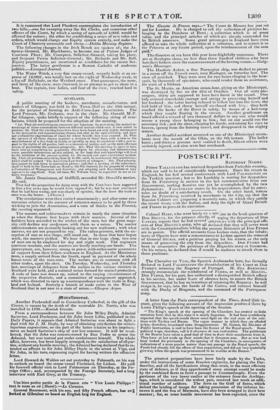SCOTLAND.
A public meeting of the bankers, merchants, manufacturers, and traders of Glasgow, was held in the Town-Hall on the 19th instant, for the purpose of forming an Anti-Corn-Law Association. The Lord Provost, Mr. Grahame, was in the chair. Mr. Oswald, M. P. for Glasgow, spoke briefly in support of the following string of reso- lutions, which he proposed for the adoption of the meeting.
" 1st. That all restrictions on commerce are injurious, by preventing the mutual in- terchange of those commodities between different nations which each is best suited to produce. 2d. That the existing Corn-laws have been found not only highly detrimental to the mercantile and manufacturing classes, but also to the agriculturists, and have not realized the expectations of those for whose benetit they were enacted.3d. That the interest of all these classes requires a revision of those laws, with a view to the establishment of a free trade in Grain,as speedily as may be consistent with a just re- gard to the rights of all parties, both as a measure or justice, mid as the most effectual means of promoting the national prosperity. 4th. That this meeting do agree to lona itself into an association for promoting this object, by obtaining and disseminating every possible information on this subject, in the hope that such knowledge will lead to the abolition of the present system, by the cariest and most sltisfactory method. 5th. That all persons subscribing from 5s to 20s. each, be members of this association ; which shall be named "r he Anti-Corn-Law Society or Glasgow: 6th. That subscrip- tion-papers be laid down in convenient places; and that a meeting of the subscribers shall he held in the Town-hall, on Mitithy. the 6th January, fur the purpose of electing a Committee of Management and Secretary, and adopting each Regulations as may appear to be expedient. That, till then, Mr. William Gray be requested to net as In- terim Secretary."
Mr. James Dennistoun, of Golfhill, seconded Mr. Oswald's motion. He said,
That had the proposition for doing away with the Corn-laws been suggested to him a few years ago, he would have opposed it ; but he was now convinced that he had been wrong, and was clearly of opinion, that the freer the trade in corn was, the better. ( Cheers.)
- The resolutions were then carried unanimously; and after some con- versation relative to the amount of entrance-money to be paid by those wishing to join the Association, and a vote of thanks to the Provost, the meeting separated.
The masons and cabinetmakers remain in nearly the same situation as when the dispute first began with their masters. Several of the builders have acceeded to the wishes of the men, but the great majo- rity still decline any conference with them as a union. The master cabinetmakers are anxiously looking out for new workmen ; with what success, we are not prepared to say. The calico-printers, with the ex- ception of one or two shops, still stand out. In those that have begun work, the masters yielded. We hear that in one large shop, two sets of men are to be employed for day and night work. The engineers continue resolute, and the masters are busily teaching raw hands. The journeymen, are, however, strong in purse, with enthusiastic assurances of support from their fellow-workmen in England. At the Martinmas term, a supply arrived from the South, equal to payment of the whole house-rents of the turn-outs. The nailors are, in common with all other trades, upon the alert. On Tuesday, Wednesday, and Thursday last, meetings of delegates from the eailors in the various districts in Scotland were held, and a national union formed for mutual protection. A code of laws was drawn up, suited to the varying circumstances of the respective districts, and a committee of management appointed, which was directed to open up a correspondence with the trade in Eng- land and Ireland. Scarcely a branch of trade exists in the West of Scotland that is not now in a state of union.— Glasgow Argus.
















 Previous page
Previous page